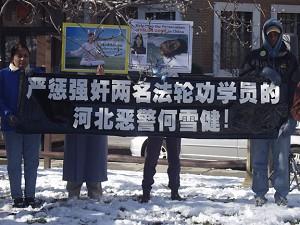Lei Dayong, a lay Buddhist from the Tongzhou district of Beijing, was sentenced in February to four years in prison for printing Buddhist scriptures.
According to Free China Forum, Lei owned a printing press and members of the local Buddhist community would often ask him to print copies of scriptures and various religious texts.
With a reputation as an honest businessman, Lei attracted a lot of business. He became known in the Beijing Buddhist circle as the guy to go to for print jobs. His printings of religious texts were even officially endorsed by Tongjiao Temple and all carried the stamp “Printing advocated by Tongjiao Temple.”
By late 2004, business had become so good that Lei opened a second printing house. At this time, a group of Buddhists from the community pooled their resources and placed an order with Lei for a large quantity of Buddhist scriptures and other printed religious materials.
In China, temples are required to obtain a permit from the government before printing religious materials. These permits are not always granted and take a long time to come through. It is even more difficult to obtain a permit to print various different religious texts at one time—this was what Tongjiao Temple wanted to do. The order they placed with Lei was for thousands of copies of 80 different religious texts—including popular Buddhists texts such as the Diamond Sutra.
Under this circumstance, Lei began printing the several hundred thousand copies of Buddhist materials while preparing to apply for a permit for internal material printing. All of the Buddhist materials he printed carry the inscription “Internal Material” or “Item not for sale, a gift for forming friendship.”
On April 27, 2005, Tongzhou district police searched the warehouse of Lei’s printing house and seized 190,000 copies of various Buddhist religious texts. An accountant and a warehouse worker, both present at the time of the search, were implicated in the illegal printings.
In May 2005, Lei and his two employees were arrested and charged with illegal publication of religious materials. The arrests did not follow legal procedures, as the police did not have the proper paperwork from the Beijing Municipal Bureau of Press and Publication at the time of the arrest.
In court, the counsel for the defendants asserted that though Lei had failed to obtain the proper permit for the printings, his had not harmed anyone and did not serve to disrupt the social order.
They argued that the three should at worst be fined for their misbehavior. The prosecution also made a mistake in bringing the charges that the defense felt should exempt the three from punishment.
The courts in Beijing did not see things the same way. They sentenced Lei Dayon to four years in prison for illegal business management. Yang was sentenced to three years and Wang, the accountant, to two.
Lei’s attorney appealed the case to a higher court, but that court ruled to maintain the original verdict and sentencing.
Mr. Hu Jia, a Buddhist and an AIDS activist commented on the case, “He was sentenced on February 13. The Beijing News has already reported about it as a crime of illegal business management. Lei was printing Buddhist scriptures. As these scriptures are ancient, they do not have any so-called copyright problem. Moreover, they were to be distributed for free. Lei is a devoted Buddhist and so he definitely was not seeking to make a profit from the mass printings. His motives had nothing whatsoever to do with turning a profit. I don’t know why they singled Lei out like this.” Hu also pointed out that the Chinese Communist Party regime is adopting a policy to crack down on local Buddhist communities.
“The Buddhist Association of China is under the control of the Chinese Communist Party,” said Hu. “Setting up Party Committee inside the Buddhist Association and transforming Buddhism into a system of administration conforming to common customs and seeking material gains is absurd to many senior monks. For example, monks now earn wages and have different rankings and classifications, and are required to attend communist party sponsored activities.”
This is the most recent in a string of cases signaling a crackdown on Chinese citizens who print unauthorized religious materials.
In a previous instance, a Christian Pastor, Cai Zhuohua, was sentenced to three years for printing unauthorized copies of the Christian Bible.



